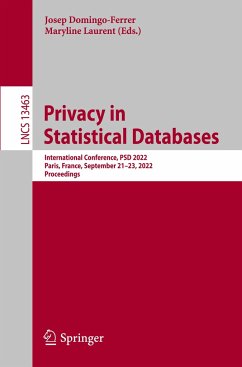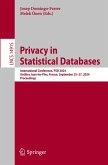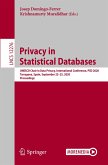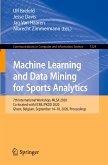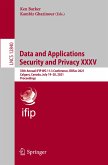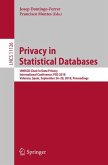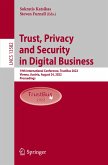Privacy in Statistical Databases
International Conference, PSD 2022, Paris, France, September 21-23, 2022, Proceedings
Herausgegeben:Domingo-Ferrer, Josep; Laurent, Maryline
Privacy in Statistical Databases
International Conference, PSD 2022, Paris, France, September 21-23, 2022, Proceedings
Herausgegeben:Domingo-Ferrer, Josep; Laurent, Maryline
- Broschiertes Buch
- Merkliste
- Auf die Merkliste
- Bewerten Bewerten
- Teilen
- Produkt teilen
- Produkterinnerung
- Produkterinnerung
This book constitutes the refereed proceedings of the International Conference on Privacy in Statistical Databases, PSD 2022, held in Paris, France, during September 21-23, 2022. The 25 papers presented in this volume were carefully reviewed and selected from 45 submissions. They were organized in topical sections as follows: Privacy models; tabular data; disclosure risk assessment and record linkage; privacy-preserving protocols; unstructured and mobility data; synthetic data; machine learning and privacy; and case studies.
Andere Kunden interessierten sich auch für
![Privacy in Statistical Databases Privacy in Statistical Databases]() Privacy in Statistical Databases56,99 €
Privacy in Statistical Databases56,99 €![Privacy in Statistical Databases Privacy in Statistical Databases]() Privacy in Statistical Databases80,24 €
Privacy in Statistical Databases80,24 €![Machine Learning and Data Mining for Sports Analytics Machine Learning and Data Mining for Sports Analytics]() Machine Learning and Data Mining for Sports Analytics38,99 €
Machine Learning and Data Mining for Sports Analytics38,99 €![Data and Applications Security and Privacy XXXV Data and Applications Security and Privacy XXXV]() Data and Applications Security and Privacy XXXV38,99 €
Data and Applications Security and Privacy XXXV38,99 €![Privacy in Statistical Databases Privacy in Statistical Databases]() Privacy in Statistical Databases49,99 €
Privacy in Statistical Databases49,99 €![Trust, Privacy and Security in Digital Business Trust, Privacy and Security in Digital Business]() Trust, Privacy and Security in Digital Business42,99 €
Trust, Privacy and Security in Digital Business42,99 €![Cyberspace Safety and Security Cyberspace Safety and Security]() Cyberspace Safety and Security49,99 €
Cyberspace Safety and Security49,99 €-
-
-
This book constitutes the refereed proceedings of the International Conference on Privacy in Statistical Databases, PSD 2022, held in Paris, France, during September 21-23, 2022.
The 25 papers presented in this volume were carefully reviewed and selected from 45 submissions. They were organized in topical sections as follows: Privacy models; tabular data; disclosure risk assessment and record linkage; privacy-preserving protocols; unstructured and mobility data; synthetic data; machine learning and privacy; and case studies.
The 25 papers presented in this volume were carefully reviewed and selected from 45 submissions. They were organized in topical sections as follows: Privacy models; tabular data; disclosure risk assessment and record linkage; privacy-preserving protocols; unstructured and mobility data; synthetic data; machine learning and privacy; and case studies.
Produktdetails
- Produktdetails
- Lecture Notes in Computer Science 13463
- Verlag: Springer / Springer International Publishing / Springer, Berlin
- Artikelnr. des Verlages: 978-3-031-13944-4
- 1st ed. 2022
- Seitenzahl: 388
- Erscheinungstermin: 5. August 2022
- Englisch
- Abmessung: 235mm x 155mm x 21mm
- Gewicht: 587g
- ISBN-13: 9783031139444
- ISBN-10: 3031139445
- Artikelnr.: 64280319
- Herstellerkennzeichnung
- Springer-Verlag GmbH
- Tiergartenstr. 17
- 69121 Heidelberg
- ProductSafety@springernature.com
- Lecture Notes in Computer Science 13463
- Verlag: Springer / Springer International Publishing / Springer, Berlin
- Artikelnr. des Verlages: 978-3-031-13944-4
- 1st ed. 2022
- Seitenzahl: 388
- Erscheinungstermin: 5. August 2022
- Englisch
- Abmessung: 235mm x 155mm x 21mm
- Gewicht: 587g
- ISBN-13: 9783031139444
- ISBN-10: 3031139445
- Artikelnr.: 64280319
- Herstellerkennzeichnung
- Springer-Verlag GmbH
- Tiergartenstr. 17
- 69121 Heidelberg
- ProductSafety@springernature.com
Privacy models.- An optimization-based decomposition heuristic for the microaggregation problem.- Privacy Analysis with a Distributed Transition System and a data-wise metric.- Multivariate Mean Comparison under Differential Privacy.- Asking The Proper Question: Adjusting Queries To Statistical Procedures UnderDifferential Privacy.- Towards integrally private clustering: overlapping clusters for high privacy guarantees.- Tabular data.- Perspectives for Tabular Data Protection - How About Synthetic Data?.- On Privacy of Multidimensional Data Against Aggregate Knowledge Attacks.- Synthetic Decimal Numbers as a Flexible Tool for Suppression of Post-published Tabular Data.- Disclosure risk assessment and record linkage.- The risk of disclosure when reporting commonly used univariate statistics.- Privacy-Preserving protocols.- Tit-for-Tat Disclosure of a Binding Sequence of User Analysesin Safe Data Access Centers.- Secure and non-interactive k-NN classifier using symmetric fully homomorphic encryption.- Unstructured and mobility data.- Automatic evaluation of disclosure risks of text anonymization methods.- Generation of Synthetic Trajectory Microdata from Language Models.- Synthetic data.- Synthetic Individual Income Tax Data: Methodology, Utility, and Privacy Implications.- On integrating the number of synthetic data sets m into the a priori synthesis approach .- Challenges in Measuring Utility for Fully Synthetic Data.- Comparing the Utility and Disclosure Risk of Synthetic Data with Samples of Microdata.- Utility and Disclosure Risk for Differentially Private Synthetic Categorical Data.- Machine learning and privacy.- Membership Inference Attack Against Principal Component Analysis.- When Machine Learning Models Leak: An Exploration of Synthetic Training Data.- Case studies.- A Note on the Misinterpretation of the US Census Re-identification Attack.- A Re-examination of the Census Bureau Reconstruction and Reidentification Attack.- Quality Assessment of the 2014 to 2019 National Survey on Drug Use and Health (NSDUH) Public Use Files.- Privacy in Practice: Latest Achievements of the EUSTAT SDC group.- How Adversarial Assumptions Influence Re- identification Risk Measures: A COVID-19 Case Study.
Privacy models.- An optimization-based decomposition heuristic for the microaggregation problem.- Privacy Analysis with a Distributed Transition System and a data-wise metric.- Multivariate Mean Comparison under Differential Privacy.- Asking The Proper Question: Adjusting Queries To Statistical Procedures UnderDifferential Privacy.- Towards integrally private clustering: overlapping clusters for high privacy guarantees.- Tabular data.- Perspectives for Tabular Data Protection - How About Synthetic Data?.- On Privacy of Multidimensional Data Against Aggregate Knowledge Attacks.- Synthetic Decimal Numbers as a Flexible Tool for Suppression of Post-published Tabular Data.- Disclosure risk assessment and record linkage.- The risk of disclosure when reporting commonly used univariate statistics.- Privacy-Preserving protocols.- Tit-for-Tat Disclosure of a Binding Sequence of User Analysesin Safe Data Access Centers.- Secure and non-interactive k-NN classifier using symmetric fully homomorphic encryption.- Unstructured and mobility data.- Automatic evaluation of disclosure risks of text anonymization methods.- Generation of Synthetic Trajectory Microdata from Language Models.- Synthetic data.- Synthetic Individual Income Tax Data: Methodology, Utility, and Privacy Implications.- On integrating the number of synthetic data sets m into the a priori synthesis approach .- Challenges in Measuring Utility for Fully Synthetic Data.- Comparing the Utility and Disclosure Risk of Synthetic Data with Samples of Microdata.- Utility and Disclosure Risk for Differentially Private Synthetic Categorical Data.- Machine learning and privacy.- Membership Inference Attack Against Principal Component Analysis.- When Machine Learning Models Leak: An Exploration of Synthetic Training Data.- Case studies.- A Note on the Misinterpretation of the US Census Re-identification Attack.- A Re-examination of the Census Bureau Reconstruction and Reidentification Attack.- Quality Assessment of the 2014 to 2019 National Survey on Drug Use and Health (NSDUH) Public Use Files.- Privacy in Practice: Latest Achievements of the EUSTAT SDC group.- How Adversarial Assumptions Influence Re- identification Risk Measures: A COVID-19 Case Study.

